Azalea Bonsai Tree is the most popular flowering bonsai. Azaleas are best kept outdoors and display a stunning range of red pink and white flowers in spring
Azalea bonsai tree (Rhododendron indicum ‘Satsuki azalea’)
The Satsuki Azalea is the most popular flowering bonsai, producing a stunning display of red, pink and white blooms every spring. When not in flower, it is an attractive evergreen species that is native to Japan.
Placement
The Azalea bonsai tree satsuki is an outdoor bonsai species, and you should choose a location for it which replicates the woodland environment they have evolved in. They do best when they are provided with a lot of sun to help ripen the shoots from which flowers will come but also provide it with some shade, especially during the hottest parts of summer days.
During winter, your Azalea will require a dormant period which can be achieved with temperatures around 2-12 °C but it is important to protect from temperatures lower than this and especially frost. This can be done by moving the Azalea to a cold frame, unheated greenhouse or by using insulation.
Watering
There is no definitive guide to watering and it should be conducted on an observational schedule, not a routine. This means that it is important to keep an eye on the moisture levels of the soil to avoid over and under watering, both which can lead to dropping leaves and/or root death. The amount of water a bonsai requires depends on pot size, climate, airflow, soil and tree type so it is best to use your eyes and fingers to assess whether the soil is damp, wet or dry.
If the top inch or so of soil has dried, it is ready to be watered. When you water, ensure an even coverage over the roots and soil, allowing water to flow out from the bottom of the pot to ensure a good soaking. If you are a first-time bonsai owner, another good way to water is by submerging the entire pot in water until the bubbles stop. If you choose this method, be aware that your bonsai may not need watering for another two or three days, but this will depend on the factors mentioned above.
Fertilising
Using fertiliser on your Azalea bonsai tree satsuki will help encourage healthy growth and this should be done periodically from once a week to every two months and only during the growing season. You can start adding Chrystal Liquid Bonsai Feed to your water from March until October and use weekly. Use Naruko Fertiliser Slow Release Bonsai Feed once every one to two months. With bonsai trees, less is more and we tend to advise using half the recommended dosage to see how your bonsai reacts first.
Regular feeding is essential to the trees’ flowering and if not done properly could result in no flowers some years. However, during the blooming period, reduce the amount of feeding by half or stop altogether to favour flowering over vegetative growth.
Pruning and wiring
Pruning your bonsai is important not only to maintain or create an aesthetic style but to also ensure light and airflow can reach inner leaves and the Azalea tolerates aggressive pruning well. The base of the shrub will need harder pruning than the twigs and branches on top since it is one of the few species suitable for bonsai that grows basally. As soon as the flowers have wilted and died, pinch or cut them off. In this time period, begin pruning the branches and leaves too, since the buds for next year’s flowers will form in summer. If left too late into the year you could risk losing them during the pruning process.
Training your Azalea bonsai tree satsuki using wiring should be conducted with great care as the wood is brittle and we recommend using wire with a larger diameter to protect its thin and soft bark. (depends on size of tree)- link to wire page Make more detail recommendations based on videos and wire recommendations
Repotting
Repotting your tree is an important way to provide a fresh and suitable soil mix and ensure appropriate root health. Repot in spring or after flowering. Generally, your Azalea bonsai tree satsuki will need to be re-potted once every two years if it is young and older ones can stay in their pots for longer. However, you should always check if it has become root-bound before you change pots. You can do this by lifting the tree gently out of the pot by the main trunk and examining the root system. You will know it is ready if you can see that the roots are circling around each other and the pot. If, however, they still appear contained in the soil, you should place it back and wait until the following spring to check again.
The Azalea bonsai tree satsuki has roots that must be pruned with care as they are often tightly matted, thin, and tear easily. It is important that the soil mix you choose for the new pot is lime-free and we tend to use a mixture of different speciality bonsai soils on our trees. Every species is different so please contact us for free soil-mix advice or to take advantage of our re-potting service, visit https://miyagibonsai.co.uk/services/.
azalea bonsai tree satsuki
Showing all 5 results
-
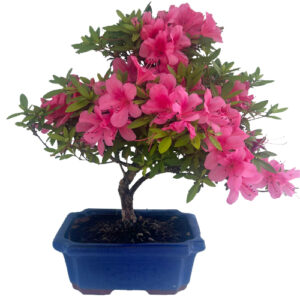
Pink Flowering Satsuki Azalea 36cm
£90.00 Add to basket -
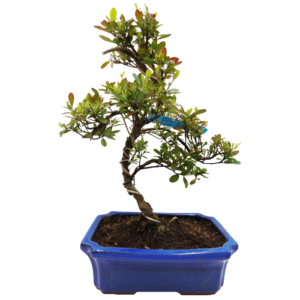
Colourful Blooming Satsuki Azalea 40cm
£100.00 Add to basket -
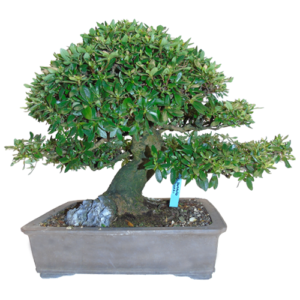
Satsuki Azalea Yamano Hikari
£3,250.00 Add to basket -
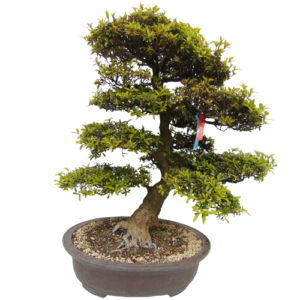
Mature Multi Coloured Flowering Satsuki Azalea 95cm
£2,500.00 Add to basket -
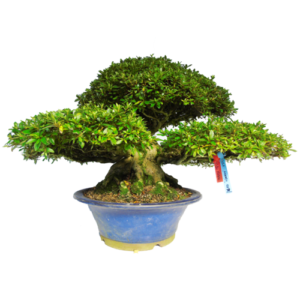
Satsuki Azalea Nikko Bonsai 60cm
£2,500.00 Add to basket
